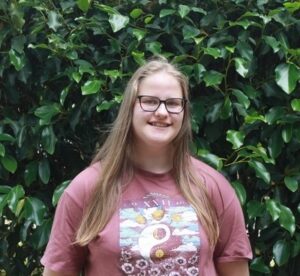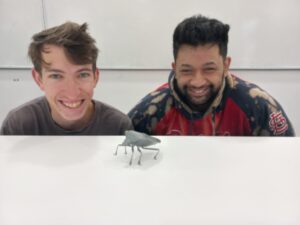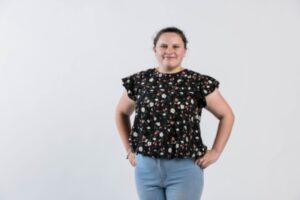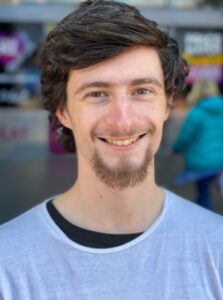Producing videos in Te Reo and English to help mana whenua recognise fall armyworm (FAW); collecting air samples to detect the DNA of weeds, pathogens and insects; and 3D printing a model of the brown marmorated stink bug (BMSB) to raise community awareness are some of the projects undertaken by this year’s summer students.
Every year B3 welcomes students from a range of universities to take part in its research programme over the summer. This year’s students are:
Jordan Pickering (Ngāpuhi)
Jordan is making videos in English and Te Reo to support Te Tai Tokerau mana whenua to look for and recognise the FAW and understand the pest’s potential impact on native taonga species. The FAW has been found in Aotearoa New Zealand and has potential to badly damage maize/corn crops which could negatively affect Māori growers in Northland and might move into native grasses.
Summer Studentship supported by Plant & Food Research’s Te Rito programme and the Ministry for Primary Industries. Jordan is being supervised by Frances MacDonald and mentored by Hone Ropata, both from Plant & Food Research.

Olivia Mairs
Olivia will capture a range of air samples containing pollen, insects and fungi as part of a wider B3 project to develop environmental DNA (eDNA) methodologies for biosecurity purposes. eDNA methods have been used for pest detection from water samples for nearly a decade in Aotearoa New Zealand but this study is one of the first locally to research the potential of the tool for surveillance of invasive taxa, including weeds (pollen), pathogens (bacteria and fungi), and insects.
Summer Studentship supported by B3 and Scion. Olivia is being supervised by Andrew Cridge of Scion.

Te Matau O Te Rangi (Te Ati Haunui-a-Pāpārangi) and Joel Tregurtha
Te Matau and Joel are developing and 3D printing a model of the BMSB to help raise awareness of the potential for a costly invasion of the pest. The 3D model could be used in public awareness outreach programmes, children’s activities and community events such as field days. The BMSB has not been found in Aotearoa New Zealand but could have multi-billion dollar implications for our economy and horticulture industries if it established here.
Summer Studentship supported by the BMSB Council and the B3 through Plant & Food Research’s Te Rito programme. Te Matau and Joel are being supervised by David Teulon at B3 and Euan Coutts and Ali Reza Nazmi at the University of Canterbury.

From left: Joel and Te Matau with their 3D printed brown marmorated stink bug.
Kelly-Anne Bentley (Ngāti Kahungunu ki Wairarapa and Ngāi Tahu)
Kelly-Anne is looking at potential badnaviruses – part of the largest and most diverse group of viruses in plants – in plants indigenous to Aotearoa New Zealand. She is working as part of a wider B3 project studying exotic badvaviruses and developing new diagnostic methods to better understand the risk they may pose for plants at the border in post-entry quarantine. The research team is trying new diagnostic methods on plant samples testing positive for badnaviruses.
Summer Studentship supported by B3 through Plant & Food Research’s Te Rito programme. Kelly-Anne is supervised by Rebekah Frampton at Plant & Food Research.

Stacee Maki (Ngai Tūhoe & Te Whakatōhea)
Stacee will develop a template to more rapidly evaluate the potential of new phytosanitary treatments for commodity items at the border. This will help streamline research efforts and costs by narrowing the range of potential treatments best suited to Aoteaora New Zealand’s biosecurity system. It will also contribute to the ongoing search for alternatives to ozone-depleting fumigants and to improving the use or combination of existing treatments.
Summer Studentship supported by B3 through Plant & Food Research’s Te Rito programme. Stacee is being supervised by Kambiz Esfandi from Plant & Food Research.

Julian Manti
Julian is supporting an international pilot study to understand the potential of sentinel gardens for exotic pests and pathogen horizon-scanning. Julian is recording examples of threats to plants considered iconic in the United Kingdom that are growing in the Christchurch Botanic Gardens. The project is part of the International Plant Sentinel Network (ISPN), led by the Botanic Gardens Conservation International (BGCI).
Summer Studentship supported by the Christchurch Botanic Gardens. Julian is being supervised by Karen Armstrong from Lincoln University and Mark McNeil from AgResearch.

